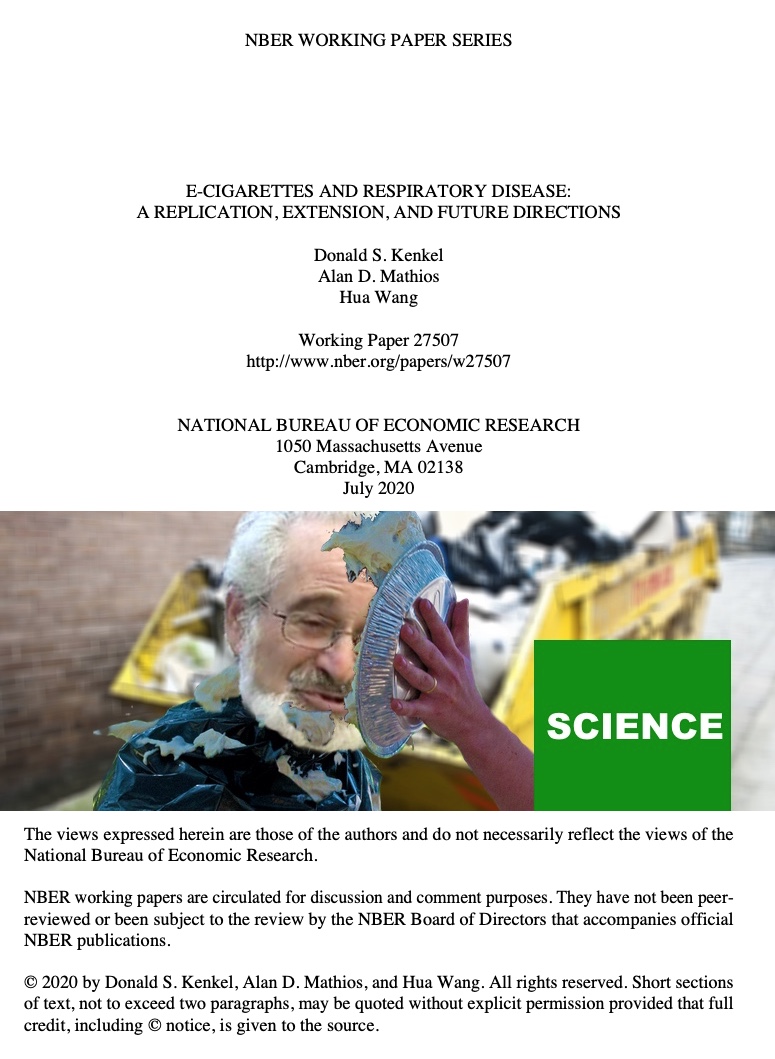Glantz and Bhatta used Population Assessment of Tobacco and Health Waves (PATH) data to ‘prove’ a link between vaping and respiratory disease. Glantz, his colleagues, and the University of California San Francisco are now banned from accessing the PATH data as a result of the pair’s academic malfeasance that resulted in a 2020 paper being retracted by the Journal of the American Heart Association.
The 2019 paper states: “Among people who did not report respiratory disease (chronic obstructive pulmonary disease, chronic bronchitis, emphysema, or asthma) at Wave 1, the longitudinal analysis revealed statistically significant associations between former e-cigarette use and current e-cigarette use.”
They concluded: “Use of e-cigarettes is an independent risk factor for respiratory disease in addition to combustible tobacco smoking. Dual use, the most common use pattern, is riskier than using either product alone.”
Glantz went even further in his claims when the paper was published: “We concluded that e-cigarettes are harmful on their own, and the effects are independent of smoking conventional tobacco.
“This study contributes to the growing case that e-cigarettes have long-term adverse effects on health and are making the tobacco epidemic worse.”
Kenkel, Wang, and Mathios’s paper is a comprehensive demolition of the Glantz and Bhatta ‘research’ and their fatuous statements.

“In this paper we replicate and extend the analysis of a recent study by Bhatta and Glantz (2019, hereafter B & G) of the association between e-cigarette use and long-term respiratory disease,” they write.
“The statistical associations that B & G find between e-cigarette use and respiratory disease are driven by e-cigarette users who are also current or former smokers of combustible tobacco. Compared to only smoking combustible tobacco, dual use of e-cigarettes and combustible tobacco is associated with a about the same risk of respiratory disease.
“A striking feature of the PATH data analyzed by B & G is that almost all e-cigarette users were either current or former smokers of combustible tobacco. In the longitudinal analysis sample with 17,601 observations, there were only 12 current e-cigarette users who had never smoked combustible tobacco. None of the 12 respondents had incident (new) respiratory disease. The number of respondents who only used e-cigarettes is simply not large enough to draw meaningful conclusions about the independent association between e-cigarette use and respiratory disease.”
“We find no evidence that current or former e-cigarette use is associated with respiratory disease”
The trio concluded: “We find no evidence that current or former e-cigarette use is associated with respiratory disease. Replication is a vital part of the scientific method.”
They state that Glantz and Bhatta made, “spurious associations with health problems”.
Spurious: false, fake, bogus, forged, specious, unauthentic, illegitimate, sham
Expert Brad Rodu commented: “It is important to note that Bhatta and Glantz used the same federal grants, totalling $13.6 million, to fund both the retracted JAHA heart attack study and the bogus AJPM respiratory disease study. As I said in February, massive amounts of taxpayer dollars flowing to U.S. researchers who are anti-tobacco, anti-harm-reduction, in service of the government’s stated objective ‘to create a world free of tobacco use.’ Still, it is intolerable for public funds to be used in the production of scientifically unsound research.”
The American Journal of Preventative Medicine has to retract the study by Bhatta and Glantz.
Related:
- “Association of E-Cigarette Use With Respiratory Disease Among Adults: A Longitudinal Analysis”, Bhatta and Glantz – [link]
- Retraction of Bhatta and Glantz’ 2020 paper “Electronic Cigarette Use and Myocardial Infarction” – [link]
Dave Cross
Journalist at POTVDave is a freelance writer; with articles on music, motorbikes, football, pop-science, vaping and tobacco harm reduction in Sounds, Melody Maker, UBG, AWoL, Bike, When Saturday Comes, Vape News Magazine, and syndicated across the Johnston Press group. He was published in an anthology of “Greatest Football Writing”, but still believes this was a mistake. Dave contributes sketches to comedy shows and used to co-host a radio sketch show. He’s worked with numerous vape companies to develop content for their websites.
Join the discussion
Parliament Fears Two
The Department for Environment, Food and Rural Affairs faced questions from a Conservative MP and, oddly, a member of the Department for Environment, Food and Rural Affairs
Harm Reduction For The Rich
The United Kingdom risks becoming a harm reduction country only for the wealthy, according to Michael Landl of the World Vapers’ Alliance
Sacrificing Health For 2p Cut
Tory Government alienates vaping voters with its mission to cut tax by an unaffordable 2p to attract voters by placing a tax on vape products in the forthcoming budget
Scotland Announces Single-Use Vape Action
A ban on the sale and supply of single-use vapes in Scotland is due to come into effect on 1 April 2025, under proposed legislation published today












